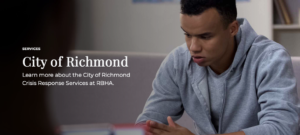 by James C. Sherlock
by James C. Sherlock
The Marcus Alert is named after Marcus-David Peters, a teacher killed by Richmond police in 2018 amid a mental health crisis.
The Marcus Alert system requires coordination between 911 and regional crisis call centers and establishes a specialized behavioral health response from a combination of behavioral health professionals and law enforcement when responding to a behavioral health situation.
It sounds right, but is dangerous to unarmed responders. We will have to work through that to see if the program is sustainable over time. And where.
Richmond. A Virginia law passed in a 2020 Special Session funded a Marcus Alert System as a prototype in five localities across the state. The City of Richmond is one of those. It launched its program on December 1, 2021.
The Marcus Alert plan in Richmond is being implemented as a collaboration among:
- Richmond Behavioral Health Authority
- Richmond Police Department
- Richmond Department of Emergency Communications
- Local Planning Stakeholder Group
Mobile co-responder teams including law enforcement are part of the program.
It sets up a decision for call center operators to make under pressure. Send cops or send a specialized mobile behavioral response team?
This program is new, funded by the state at $600,000 per locality, and supposed to be fully operational in the five first adopter localities by July 1 of this year. So there is no data to judge its effectiveness or the tradeoffs between citizen and responder safety in such a change.
Virginia Beach, however, has had a mobile co-responder team in place since 2018. I am unable to find any data on its utilization and experiences since then. I plan to enquire and will report in a future article.
It is obvious that there will be issues of unarmed responder safety. Police are often assaulted in such situations. What will happen when the first unarmed response team member is assaulted? When the first unarmed responder death occurs?
We will find out.
There is another problem in Richmond. It is not only short of cops.
The Richmond Behavioral Health Authority as of this morning is advertising 119 job openings in an authorized end strength of about 750. One in six.
Twenty-one of those vacancies are nurses. Four open positions are in crisis services, including a Region 4 Marcus Alert Coordinator. Twenty one positions are clinicians, including emergency services clinicians.
Bottom line. Groups like the National Alliance for Mental Illness and social justice organizations lobbied hard for the Marcus Alert program.
They cast grossly unfair and unnecessary aspersions at the police in the process, which most, including me, find objectionable. Those tactics made the program politically charged when it did not need to be. It could have stood on its own potential merits, as it did in Virginia Beach.
It is a case of “be careful what you ask for.” Lots of hills to climb. Like all such things, success will be dependent upon its competent administration and well-trained responder teams. It will work in some places and fail in others.
The danger to mental health crisis employees is real, even in their own facilities. Field responses are a different ballgame. Even when the mental health personnel are available, willing and able to do it.
But Godspeed. I really hope it works.

Leave a Reply
You must be logged in to post a comment.